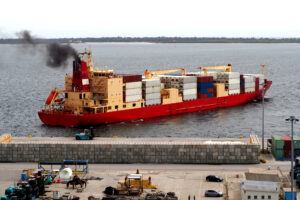Macron calls for the mobilisation of an international tax regime to fund development.
French President Emmanuel Macron speaking to FRANCE 24, RFI and franceinfo on the second day of the Summit for a New Global Financing Pact, emphasised the need for global cooperation in implementing an international tax regime to support coordinated action on both climate and alleviating poverty in a live interview.
The idea of a global tax on the greenhouse gas emissions produced from international shipping has been gaining traction.
Emmanuel Macron expressed his support in growing international momentum towards a levy on shipping emissions ahead of the upcoming International Maritime Organisation meeting in early July and called for a greater push towards establishing a tax on maritime transport.
“The maritime sector should be taxed. This is tax-free sector and there’s no reason why it’s not taxed,” Macron said.
French media also quoted Macron as saying that “shipping industry should be taxed more because there are not taxed at all and money received from that sector can be used to tackle climate change.”
Although the International Maritime Organisation (IMO) adopted an Initial Strategy on Greenhouse Gas Emissions Reduction from Ships (in 2018), which set an absolute GHG reduction target of 50% to reach by 2050, GHG emissions from shipping continue to rise, and are close to reaching 3% of all man-generated GHG emissions, as EU reveals. From 3-7 July 2023, the IMO’s Marine Environment Protection Committee will meet in London to adopt a revised IMO climate strategy.
In view of the London IMO MEPC meeting and the UN Climate Ambition Summit, the EU Delegation to the UN, together with Denmark, Palau and Samoa and with the participation of Special Adviser to the UNSG and ASG of the Climate Action Selwin Hart, hosted a 21 June meeting in New York to discuss climate and shipping, outlining the EU’s proposals for a new climate targets for the shipping sector.
The EU believes that international shipping needs to peak its emissions as soon as possible. Accordingly, minus 29% emissions until 2030, and minus 83% until 2040 would be good interim targets.
To reach net zero by mid-century, the EU will propose a technical measure of a greenhouse gas fuel standard. This would mandate a gradual reduction in the GHG intensity of marine fuels used on ships.
As an economic measure, the EU will propose a levy on the shipping sector’s greenhouse gas emissions. The amount of the levy would be proportionate to the amount of GHG emitted by the ship concerned. The EU is open to discuss the use of the revenues from the levy, including for countries vulnerable to climate change.



